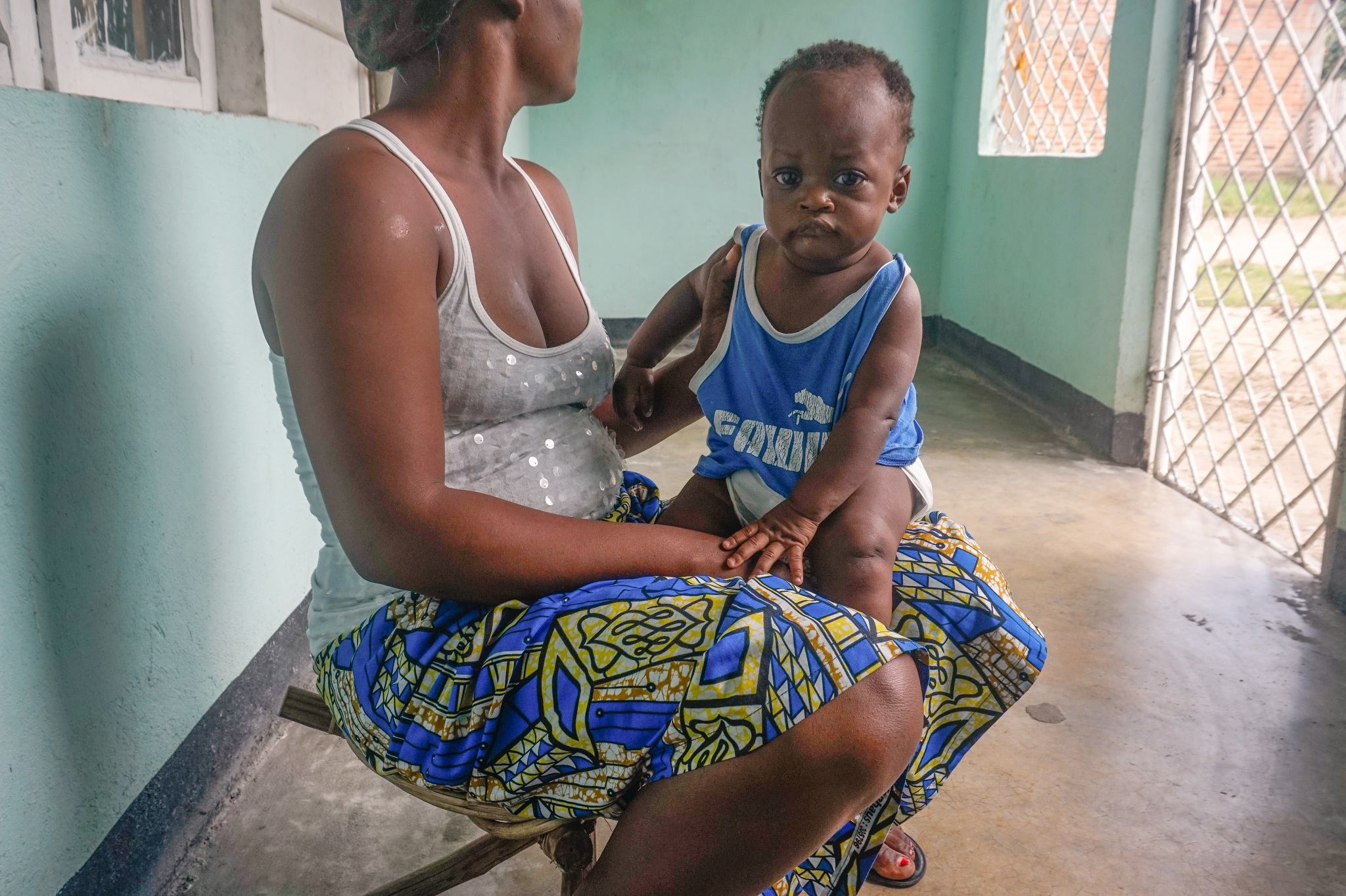
Photo by Françoise Mbuyi Mutombo, GPJ DRC
Fanny Kunda holds her 7-month-old son, Resolu Sabiti, in Makiso, Democratic Republic of Congo. A severe shortage of pediatric vaccines has left children like Resolu vulnerable.
KISANGANI, DEMOCRATIC REPUBLIC OF CONGO — Fanny Kunda sits in front of her home with her son, Resolu Sabiti, on her lap. The baby boy is unusually calm, a sign that he’s not well.
“I am really scared for him,” Kunda says, distraught. “I don’t know what to do anymore.”
The baby has a fever, which isn’t uncommon, but Resolu, at 7 months old, is still unvaccinated. Children should receive their first vaccines within two months of birth, according to the United States Centers for Disease Control and Prevention. But a severe shortage of pediatric vaccines in DRC, driven by funding issues and refocused efforts during the pandemic, has left many children at risk of contracting life-threatening diseases. Dwindling vaccines have forced health care administrators to prioritize children living with HIV because their immunity is compromised. That has led to a spike in the infant mortality rate, leaving parents like Kunda scared for their children.
Dr. Boms Bonyoma, the provincial coordinator of Programme Elargi de Vaccination, the government’s immunization program, says data from the first half of 2021 showed a 23% increase in infant deaths in Kisangani, the capital of the country’s north central Tshopo province, compared to the previous year. “This is a crisis the government has created because it has chosen to focus more on the COVID-19 pandemic and ignored the vaccination needs of newborns,” he says.
Dr. Olinda Loko Abisa, the provincial coordinator of Programme National Multisectoriel de Lutte Contre le SIDA, an agency that leads the national fight against HIV/AIDS, says the pediatric vaccine shortage is nationwide and has been going on for about two years.
“This shortage is happening because the central government hasn’t paid its debt to its external partner, The Global Fund,” Abisa says.
For 2020-2022, DRC pledged $6 million to The Global Fund, an organization that partners with governments and private sectors around the world to tackle disease. But the government has not paid any of it, according to The Global Fund.
Dr. Francis Baelongadi, the chief of Division Provinciale de Santé, Tshopo’s provincial health department, defends the government’s actions. He says officials have needed to focus on curbing the spread of COVID-19. “The government is investing in ensuring that we have the coronavirus vaccine,” Baelongadi says.
But DRC gets its coronavirus vaccines for free through COVAX, a COVID-19 vaccine-sharing program led by the World Health Organization. The country also has one of the lowest vaccine acceptance rates in the world. Only about 0.61% of DRC’s 90 million people have been fully vaccinated, far below the continental average of 15.85%, according to the Africa Centres for Disease Control and Prevention. Around 1,300 people in DRC have died of COVID-19 since the pandemic began, according to Johns Hopkins University’s Coronavirus Resource Center, indicating that the disease has not been a significant threat to Africa’s second-largest country. But Baelongadi insists that the government still has to fight the pandemic.
“The government cannot cross its arms and do nothing just because people have refused the coronavirus vaccine,” he says.
When asked for details on what the government is doing to combat COVID-19, and how it may have neglected programs to immunize children, Baelongadi says that’s a question for central government. The Ministry of Health in Kinshasa didn’t respond to repeated requests for comment.
Because of the shortage, public health officials and health care advocates tried to give vaccine priority to children living with HIV, says Abisa, the coordinator of the campaign against HIV/AIDS in Tshopo. In January 2021, Caritas Internationalis, a coalition of Catholic charitable organizations operating in more than 160 countries, began a campaign to test children in Tshopo for HIV. They identified 1,516, and 601 were assigned to health care centers and recommended for antiretroviral treatment. But only 21 children have been put on treatment because there is also a drug shortage, says Dr. Jean Munongo, the national coordinator of health promotion service at Caritas Congo.
The vaccine and ARV shortage has parents worried that their children could develop AIDS. Paulin Neboya, whose 3-year-old son tested positive for HIV, says she was upset when she was told that there was shortage of medicine for him.
“I am stuck, and I don’t know what to do,” she says.
Vaccines are available at private clinics — for a price. Kunda, who earns about 3,000 Congolese francs ($1.50) a day, finally decided to pay 10,000 francs (about $5) to vaccinate Resolu.
“We have never had to pay for vaccines,” she says, “but I need to save my child’s life.”
Zita Amwanga is a Global Press Journal reporter based in Kisangani, Democratic Republic of Congo.
Françoise Mbuyi Mutombo, GPJ, contributed reporting to this article.
Translation Note
Megan Spada, GPJ, translated this article from French.







